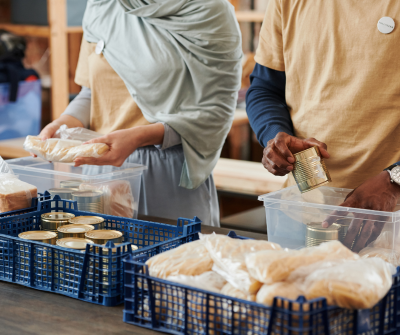Ethical Leadership Tensions in the Voluntary Sector: the example of food banks
This blog was written by Dr Daniel Haslam with thanks to Dr Nik Winchester for feedback on an earlier version.
Introduction

At a recent event I attended I took part in a workshop focussing on food banks. Several of the attendees spoke about the pressures they were under in their roles, and the difficult decisions they had to make on a daily basis to support people in need.
I reflected on how these tensions are a good example of the work that CVSL has been doing on ethics and leadership, in particular the notion of ‘leadership tensions’.
This blog focuses on some of these ethical leadership tensions in food banks, drawing on work presented by my colleague Dr Nik Winchester at the International Studying Leadership Conference (ISLC) in 2021. The ISLC conference was hosted by the Open University Business School, and you can find the full programme here: ISLC PROGRAMME LINK
Focus on food banks – leadership tensions
It is not hard to find news stories about the rising demand for food banks across the UK.
I’ve personally read recent accounts from Sunderland (BBC, 2022a), Swansea (BBC, 2022b), and Telford (BBC, 2022c). Many of these examples echo what those responsible for the leadership of foodbanks spoke about in the workshop I attended and the tensions they experience in their roles*.
These issues include:
- Changing client needs - the growth of users who are in work compared to those who are not; the homeless; and/or those in crisis
- Reductions in donations
- Whether or not to work with the national food bank brands who offer scale and access but who are often expensive and do not offer choice
- Whether to allow self-referral or not
- Whether to make accessing wider support – such as debt advice - part of the requirements of access to food
- The stigma of ‘surplus food for surplus people’
- Changing models of delivery – from food banks to food pantries (see for example BBC, 2022d)
- Focussing on food or offering additional services, such as ‘warm banks’ (BBC, 2022e)

One thing that was clear to me from reading the articles about food banks and hearing people talk in the workshop was that people responsible for leadership in food banks express a high level of care for their clients.
However, the leadership tensions above point out how care often has limits which require difficult decisions to be made.
These decisions themselves are subject to ethical debates which often do not have easy answers.
Leadership and care
Thinking about decision making through the ethics of care lens offers us a nuanced way of understanding leadership in the food bank context. Care ethics is rooted in our relations with others and our actions in response to the needs expressed within those relationships. Tronto (2017) describes five phases of caring:
- Caring about – noticing an unmet need
- Caring for – taking responsibility to meet those needs
- Caregiving – that act of giving care
- Care receiving – the response from the person/thing being cared for
- Caring with – the ongoing cycle of care involving groups of people
All of these phases require an approach that considers interacting elements, emotions, and perspectives. This necessarily involves conflict between the phases because they are at times in opposition to one another. Our work in CVSL (Winchester et al., 2021) also points out the conflict that exists within each phase, for example, ‘caring about’ is a practice of both focus (what you choose to care about) and withdrawal (what you do not). Conflict, difficult emotions and uneasy trade-offs are therefore intrinsic to care.
Working through this conflict as applied to the various leadership tensions within foodbanks means that simple answers are unlikely to be very helpful. How, for example, should food bank workers decide who is eligible or not from their different client groups? They may ‘care about’ all groups equally but ultimately only ‘care for’ one subgroup of clients over others. Also, the different expectations of the ‘care receiver’ (those using food bank services) may mean the wider support offer is refused – essentially rejecting care.
These debates are ethically very messy, and it is difficult to suggest a definitively ‘right’ or ‘wrong’ answer.
Thinking about leadership and care in a way that acknowledges there is often no single or correct resolution to these tensions, and that care is in some ways ‘tragic’ because of this, may provide us with a more helpful (and perhaps more realistic) way of understanding practice.
Conclusion
People enacting leadership in foodbanks already know through experience the tensions they have to negotiate. Unpacking what the ethics of care could mean in this context can provide a way to navigate those decisions and thinking through the five phases may provide a structure through which to do this.
We hope to continue our work on ethics, care, and leadership at CVSL in the coming months. For more information, please sign up to our newsletter or email the centre, both of which you can do here: CLICK FOR CVSL CONTACT PAGE
*There are of course wider debates about the role of food banks in society which I won’t address in this blog such as supporting waste in big businesses (Garthwaite, 2019), their role as ‘successful failures’ (Caraher, 2017), and the depoliticization of poverty - treating the symptoms rather than the cause (Rose and Booth, 2017).
References
BBC (2022a) ‘It used to be homeless people, now it’s working people’, Available at: https://www.bbc.co.uk/news/uk-63303460 (Accessed: 31st of October 2022).
BBC (2022b) Swansea food bank: Extra funding as demand triples, Available at: https://www.bbc.co.uk/news/uk-wales-63231703 (Accessed: 31st of October 2022).
BBC (2022c) Telford food bank funding boost as demand soars by a third. Available at: https://www.bbc.co.uk/news/uk-england-shropshire-63287806 (Accessed: 31st of October 2022).
BBC (2022d) Birmingham community group helps feed families for £4, Available at: https://www.bbc.co.uk/news/uk-england-birmingham-63115457 (Accessed: 31st of October 2022).
BBC (2022e) Cost of living: 'We run food banks, now we're keeping people warm', Available at: https://www.bbc.co.uk/news/uk-england-norfolk-63149033 (Accessed: 31st of October 2022).
Caraher, M. (2017) Why giving surplus food to charities is not a solution to food poverty, Available at: https://theconversation.com/why-giving-surplus-food-to-charities-is-not… (Accessed: 31st of October 2022).
Garthwaite, K. (2019) It's not the hungry who gain most from food banks – it's big business, Available at: https://www.theguardian.com/commentisfree/2019/mar/25/big-business-food… (Accessed: 31st of October 2022).
Rose, N. and Booth, S. (2017) ‘Successful failures’ – the problem with food banks, Available at: https://theconversation.com/successful-failures-the-problem-with-food-b… (Accessed: 31st of October 2022)
Tronto, J. (2017) There is an alternative: homines curans and the limits of neoliberalism, International Journal of Care and Caring, 1(1): 27–43.
Winchester, N., Haslam, D., Jacklin-Jarvis, C., Logan, K., Wishart, W. (2021) ‘Re-reading leadership, ethics and care, a dialectical perspective’, 19th International Studying Leadership Conference: Don’t look up! Rebooting leadership with resistance from below, Virtual conference at The Open University (England), 12-14th December, Available at: https://business-school.open.ac.uk/events/ISLC2021-monday-programme (Accessed: 31st of October 2022).


